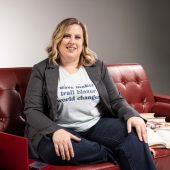No entrepreneur grows a business without questioning their pricing—it’s virtually a rite of passage on the journey to six, seven, and eight-figure success. While such uncertainty can relate to developing market knowledge, it’s more often linked to one’s personal and professional sense of self-worth.
Of course, you want to earn significant profits—that’s one of the major reasons you started a business. But assigning a number to the value you bring to the world is as much of a mindset exercise as it is a math problem. Even if the numbers make sense on paper, what’s stopping prospective clients from turning away with sticker shock?
If that question bounces around your head like a catchy song, it’s time to set aside the calculator (for now) and figure out why your instinct is to devalue your offerings.
Here are the three main reasons creatives undercharge:
Lack of confidence
If you don’t feel confident backing up your pricing with high-quality services, your prospective clients will sense it. You’re telling the universe that you’re not as great as you’re presenting yourself, which will set you up for failure.
People don’t want to buy from someone who seems insecure about their offerings. Consider why you don’t feel like you can meet clients’ expectations. If you have proof of concept from selling your offerings in the past, trust your ability to fulfill client needs and keep them happy as you always have.
Lack of objections
You can have the best offerings on the market, but you’ll never scale if you’re not willing to hear the word “no.” If everyone is saying “yes” to your prices, it means you need to raise them! You have to build the courage to raise your pricing and accept rejection; otherwise, you will find yourself overworking to maintain stagnant profit margins.
Not every lead is the right client for you. When you understand and accept that fact, you’ll feel more comfortable shaking off a “no” and moving on to the next prospect. Remember: You are the expert! If someone can’t afford you, that’s on them—it has nothing to do with the value you offer.
Lack of direction
It can be tricky knowing what to charge when launching a new offering in the market. You’re excited to put it out in the world, but you’re still figuring out how the process works and whether the pricing will hit with potential buyers. That’s OK!
Expect a learning curve as you start selling and evaluating how people respond to your new product or service. As your confidence grows, you’ll become more aware of what to charge, and you’ll likely increase your pricing as sales increase.
So the big question is always: How do I know what to include in my pricing?
If you are considering a pricing adjustment, be sure to factor in the following:
- Your time spent on the project
- Project labor (e.g., day-of assistants, virtual assistants, staff, etc.)
- Expenses (e.g., gasoline, supplies, software, graphic design, etc.)
- Incentives and bonuses (i.e., will you offer anything to sweeten the deal?)
- Profit (i.e., how much do you want to make when all is said and done?)
All of these will influence how much you charge, but if nothing else, a good rule of thumb is to increase your pricing by 10% every couple of years. This is an easy, no-pressure way to earn more money and build confidence in your new price point.
Will you get pushback from clients? Probably. But again, people who cannot afford your rates are not ideal clients. For everyone else, it’s a matter of presenting your message to highlight the actual value of your offering.
Too often, creative entrepreneurs focus on selling the features rather than the benefits. Instead of “this is what you get,” use sales calls to demonstrate “this is how your life will change for the better.” People want to know what they’ll get, but it’s not enough to convince them to invest their money. They need to know what they’ll get out of it first!
With the wedding boom upon us, it’s more important than ever to find clarity on your numbers and get comfortable charging your full worth. Your books of business are full and the inquiries are flowing in—you don’t have time to service a client that isn’t a perfect fit. You do not have to accept the buyers who only want the cheapest deal in town (and you should not!). People want results. As an event professional, you constantly deliver results, and the perfect client will recognize your worth. And to gain those results for themselves, they’ll be more than happy to “pay to play” and get the whole experience from you and your business.



